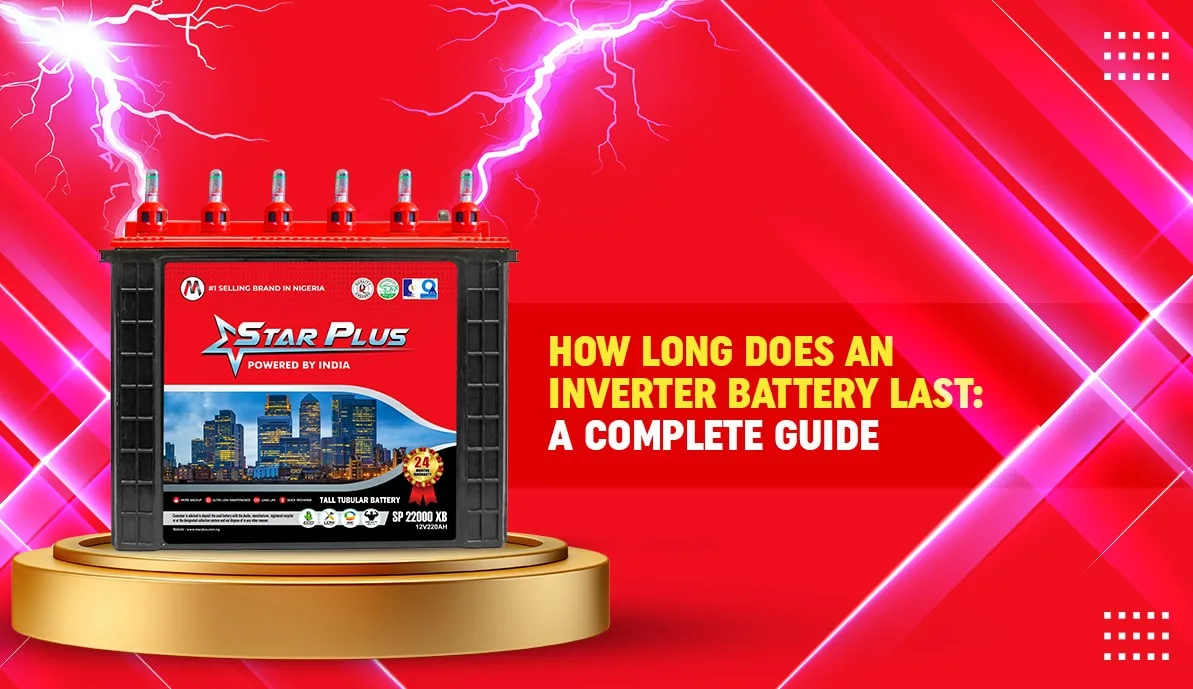High-powered inverters have gained significant popularity in Nigerian homes. Owing to frequent and prolonged power cuts, the demand for long-lasting power backup systems has increased. However, not all inverters last for a long time. Only the ones with high-capacity batteries can power up your homes.
At Star Plus Battery, we offer only premium-quality inverter batteries. You must be wondering, “How long does an inverter battery last?” That’s when we can help you.
This blog will provide you with a complete guide regarding the lifespan of an inverter battery and how you can enhance it.
If you are looking for uninterrupted power backup, check out this blog now.
Understand Your Inverter Battery
Inverter batteries can be of different types. Based on their composition and working capacity, they are installed to support multiple power needs. Irrespective of that, the functioning properties of all inverter batteries are similar.
It is a rechargeable battery that stores energy and transfers it to the inverter. Inverter batteries convert the stored DC (direct current) energy to AC (Alternating current), which is used to run electrical appliances during power cuts.
Amongst different types of inverter batteries, tubular inverter batteries are widely used due to their robust engineering and functional ability. Star Plus Battery manufactures low-maintenance tubular batteries to support Nigerian homes during the power crisis.
However, one might question whether they would last long or not. Hence, before choosing a tubular battery that can last a long time, you need to consider the following factors:
Factors to Consider Before Buying an Inverter Battery
1. Battery Capacity
The first step is to evaluate your battery’s capacity. The capacity of an inverter battery is maintained with the symbol Ah. The larger the battery capacity (Ah), the longer it will last.
You can contact us for detailed and further guidance regarding your battery’s capacity. Our experts will advise you on the suitability of your battery’s capacity according to your power needs.
2. Power Consumption
If you are wondering how to keep your inverter from draining your battery, excessive power usage can be a significant cause. Check your total power consumption before choosing your inverter battery. Running multiple appliances at once will drain your battery faster. Always calculate your total wattage and match that with your inverter battery’s capacity.
3. Battery Voltage
Higher voltage setups are more efficient and reduce power losses, extending runtime. The inverter battery voltage ranges from 24V to 48V and will suit power needs as needed.
4. Inverter Efficiency
Apart from checking your inverter battery’s efficiency, verify your inverter’s efficiency at the same time. In some cases, the inverter might be faulty and can be the primary cause of battery drainage. We at Star Plus Battery, can provide you with the best guidance in choosing the most reliable inverters along with your battery.
5. Individual Maintenance Requirements
A well-maintained inverter battery lasts longer than others. Considering individual inverter battery maintenance is necessary. For instance, you need to consider a secured and spacious storage area to keep your inverter batteries in a damp-free environment. Similarly, your water supply, temperature regulating capability, and budget need to be simultaneously considered.
After considering the factors, you need to understand specific quick tips to keep your inverter battery functioning longer. Here’s what you need to know.
Want to Buy Tubular Inverter Battery for Your Home and Office?
Maintenance Tips for Your Inverter Battery
Regular Cleaning and Maintenance
Dirt, dust, and corrosion can reduce the performance of your inverter battery. Regular cleaning prevents buildup and helps identify potential issues early. It also improves airflow around the battery, ensuring that it operates at an optimal temperature.
To avoid accidents, turn off the inverter before cleaning. Use a soft cloth or brush to remove dirt and dust. Clean the battery terminals with a mixture of water and baking soda to neutralize corrosion. Wipe the battery terminals with a clean, dry cloth after cleaning.
Maintaining Proper Temperature
Knowing how to maintain your tubular battery is essential for receiving uninterrupted power backup. Over time, battery capacity might reduce. Our tubular batteries can last at least 7 to 8 years if properly maintained and can reach upto to 10 to 12 years.
You need to maintain a proper room temperature at which the inverter battery will be stored. Ensure that the water level of your tubular battery is maintained so that the internal cooling factor remains stable.
Avoid Deep Discharges
A deep discharge occurs when a battery gets drained too much before getting charged. Consistently deep discharging an inverter battery can cause permanent damage. Batteries are designed to handle shallow discharges, so keeping the battery from draining too low is crucial for maintaining its health.
Maintaining Proper Charging Cycles
The charging cycle refers to how many times a battery is charged from 0% to 100%. Proper charging is critical for maintaining inverter batteries. Overcharging or undercharging can damage the battery and shorten its lifespan.
Our low maintenance tubular batteries have higher charge retaining capacity. This property offers users the facility to maintain a stable charging cycle.



0 Comments